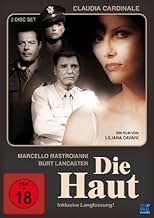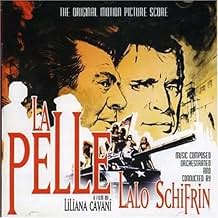CALIFICACIÓN DE IMDb
6.6/10
1.4 k
TU CALIFICACIÓN
Agrega una trama en tu idiomaAfter the Allies liberate Naples in 1943, the life for the locals is not much easier, especially for women. Many sacrifice their dignity and morale to survive.After the Allies liberate Naples in 1943, the life for the locals is not much easier, especially for women. Many sacrifice their dignity and morale to survive.After the Allies liberate Naples in 1943, the life for the locals is not much easier, especially for women. Many sacrifice their dignity and morale to survive.
- Dirección
- Guionistas
- Elenco
- Premios
- 1 premio ganado y 2 nominaciones en total
Peppe Barra
- Sarto
- (as Giuseppe Barra)
Rosaria della Femmina
- Amante di Jimmy
- (as Maria Rosaria Della Femmina)
Opiniones destacadas
Maybe , two virtues : the cast and the realism about American presence in Italy after war. Shocking, a mix of Fellini and Catch 22, seductive for beautiful work of Marcello Mastrianni and for captivity of Burt Lancaster in a cage of cliches, it is adaptation of the novel of Curzio Malaparte, offering, in same measure, more than the word of book.
Maybe, today, more convincing about reactions, cliches and ways of survive in crisis time.
Exactly this cruel exploration of truth is its real virtue.
In short, a honest perspective about prejudices and tough lessons, about people behavior and their gestures.
Not story, only a chain of episotes. At final- a spoon of bitterness.
Maybe, today, more convincing about reactions, cliches and ways of survive in crisis time.
Exactly this cruel exploration of truth is its real virtue.
In short, a honest perspective about prejudices and tough lessons, about people behavior and their gestures.
Not story, only a chain of episotes. At final- a spoon of bitterness.
This movie is based on the true memoirs of the main character (Curzio Malaparte) during his time when he acted as diplomatic liaison between the Allied forces and the Italian in the newly occupied Italy. The book is a collection of short stories depicting the collapse of the Italian society under Allied occupation. There is no story line between those short stories. The movie puts them in chronological order, but the reigning chaos and lack of moral message (the message is exactly the lack of morality) can confuse the spectator.
This is a very original war movie, in that the main theme is the not the war front. The Allied are not viewed from their own perspective, which is one of true liberators. Instead, the movie shows the Italian people courting the Allies as liberators in order to escape from starvation. The Allies themselves are caught in a trap where they know the Italian hospitality isn't sincere, but are unable to understand why. They don't realize that before them, the Germans were courted as liberators too, and that in this context of food shortage and general poverty, the only way the Italians have to secure their survival is to play that game.
Malaparte (played by Marcello Mastroiani) acts then as a translator, helping the Americans as a guide would help a tourist, by explaining in each situation why people are acting in this seemingly dishonorable way.
La Pelle (The Skin) would make more sense if compared to Malaparte's twin book on the occupied Europe (Kaputt, or Broken to Pieces). In the latter, he portrays the Nazi way of oppressing through violence. In La Pelle, he shows how the Americans achieve a similar result through economic means, while refusing any responsibility. In Kaputt, Jewish women are made prostitutes by the German Army to escape death by the bullet; in La Pelle, Italian women become prostitutes for the American Army to escape death by starvation.
This is a very original war movie, in that the main theme is the not the war front. The Allied are not viewed from their own perspective, which is one of true liberators. Instead, the movie shows the Italian people courting the Allies as liberators in order to escape from starvation. The Allies themselves are caught in a trap where they know the Italian hospitality isn't sincere, but are unable to understand why. They don't realize that before them, the Germans were courted as liberators too, and that in this context of food shortage and general poverty, the only way the Italians have to secure their survival is to play that game.
Malaparte (played by Marcello Mastroiani) acts then as a translator, helping the Americans as a guide would help a tourist, by explaining in each situation why people are acting in this seemingly dishonorable way.
La Pelle (The Skin) would make more sense if compared to Malaparte's twin book on the occupied Europe (Kaputt, or Broken to Pieces). In the latter, he portrays the Nazi way of oppressing through violence. In La Pelle, he shows how the Americans achieve a similar result through economic means, while refusing any responsibility. In Kaputt, Jewish women are made prostitutes by the German Army to escape death by the bullet; in La Pelle, Italian women become prostitutes for the American Army to escape death by starvation.
I'd like to say that all these comments against this movie are inaccurate. La Pelle is a great movie. Hollywood would never make a movie like this. This movie has nothing to do with `Pearl Harbor'. La Pelle is a work of art, this is not another US war propaganda designed for a public brain wash. This movie is realistic, funny and sad at the same time. The story is very cleaver, intelligent. Perhaps, Americans don't like it because this movie depicts the US army involved in prostitution and in a certain disregard for the Italian people. Anyway, it's the best war movie I've ever watched in my life. There is no lies like in `Rambo', there is no hate like in `Platoon' (in which is good movie too). I recommend , I would say that it's excellent.
I have more or less the same feelings toward The Skin as I do towards Liliana Cavani's more well-known The Night Porter. Both movies deal with provocative and uncomfortable sexual themes/situations taking place during World War II. Both are daring and sound fascinating on paper. Both are also weirdly boring, making me feel as though Cavani is a filmmaker who's admirably daring and willing to go to places most other directors won't go, but at the same time, can't really tell a story or make things properly involving.
Much of what The Skin and The Night Porter explores is thought-provoking and boundary-pushing. These are difficult stories that I'm glad have been told, but I just wish they were told better. I was shocked by how boring The Night Porter was, and I'm similarly surprised/disappointed by how dull and poorly paced The Skin was.
I also didn't like how the whole thing was in Italian, even though many scenes involve characters who don't speak the same language interacting and needing translators. It's very odd and distracting to have to remind yourself "I hear Italian right now, but in the film's universe, this character is actually speaking English at the moment, and so the actual Italian characters can't understand him/her."
The Skin succeeds in being thought-provoking and disturbing, but fails elsewhere, as a movie. And it's not that I think it should be "entertaining" in the traditional sense, given the subject matter. I just think it should be more involving and engrossing on a gut level. I can honestly understand why this one wallows in obscurity, despite some things here that are certainly able to be appreciated.
Much of what The Skin and The Night Porter explores is thought-provoking and boundary-pushing. These are difficult stories that I'm glad have been told, but I just wish they were told better. I was shocked by how boring The Night Porter was, and I'm similarly surprised/disappointed by how dull and poorly paced The Skin was.
I also didn't like how the whole thing was in Italian, even though many scenes involve characters who don't speak the same language interacting and needing translators. It's very odd and distracting to have to remind yourself "I hear Italian right now, but in the film's universe, this character is actually speaking English at the moment, and so the actual Italian characters can't understand him/her."
The Skin succeeds in being thought-provoking and disturbing, but fails elsewhere, as a movie. And it's not that I think it should be "entertaining" in the traditional sense, given the subject matter. I just think it should be more involving and engrossing on a gut level. I can honestly understand why this one wallows in obscurity, despite some things here that are certainly able to be appreciated.
One of my all-time favorite war films. Americans might have trouble with it as it doesn't show us in the best possible light, but it is probably very close to the truth. It demonstrates better than any film I've seen how terrible and dispiriting life can be for a defeated population. Marcello Mastroianni gives another of his trademark world-weary but compassionate performances as the liaison between the American and Italian armies.
¿Sabías que…?
- TriviaThe film's editor was Ruggero Mastroianni, Marcello Mastroianni's brother.
- ErroresAt approximately 19 mn into the movie and again at approximately 1h18 mn, Goldberg, the roommate of Jimmy Wren (Ken Marshall), is seen reading an issue of the comic book "Batman". However the cover is clearly shown and is in fact that of issue N°257, published in August 1974, ie 31 years after the events of the movie.
- ConexionesFeatured in Naples '44 (2016)
- Bandas sonorasLa Pelle
written by Roberto De Simone
sung by Maria Kelly
recorded on "La Gatta Cenerentola"
published by La voce del padrone; EMI Italiana
Selecciones populares
Inicia sesión para calificar y agrega a la lista de videos para obtener recomendaciones personalizadas
- How long is The Skin?Con tecnología de Alexa
Detalles
- Fecha de lanzamiento
- Países de origen
- Sitio oficial
- Idioma
- También se conoce como
- The Skin
- Locaciones de filmación
- Casa Malaparte, Isle of Capri, Nápoles, Campania, Italia(Villa of the main character, Curzio Malaparte)
- Productoras
- Ver más créditos de la compañía en IMDbPro
- Tiempo de ejecución2 horas 11 minutos
- Mezcla de sonido
Contribuir a esta página
Sugiere una edición o agrega el contenido que falta

Principales brechas de datos
By what name was La pelle (1981) officially released in India in English?
Responda




























